Key takeaways:
- Hospital ministry provides spiritual support, bridging healthcare and emotional healing for patients and families during difficult times.
- Spiritual care facilitates emotional resilience and can transcend religious boundaries, offering comfort and hope to all individuals.
- Personal connections and simple acts of presence during hospital visits can significantly uplift both patients and their families.
- Sharing experiences and practicing vulnerability in daily life fosters empathy and strengthens relationships, promoting community support.
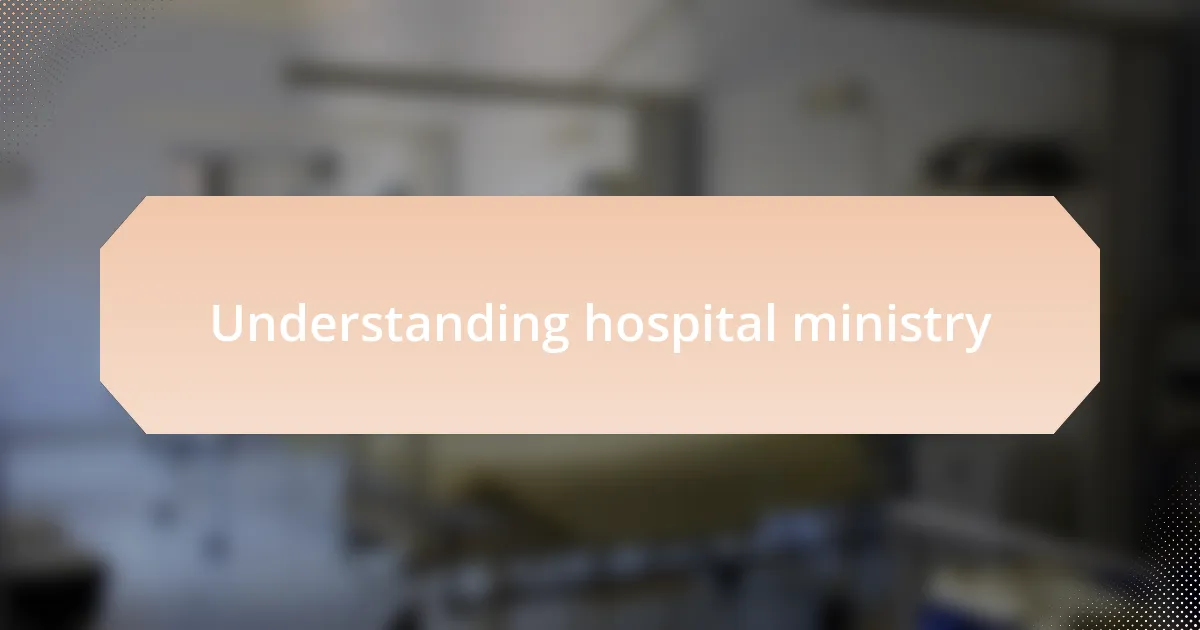
Understanding hospital ministry
Hospital ministry serves a vital role in providing spiritual support to patients and their families during some of life’s most challenging times. I distinctly remember the comfort I felt when a chaplain visited me in the hospital; their compassionate presence provided a sense of peace amid fear and uncertainty. Have you ever felt the weight of loneliness in a hospital room? That’s where hospital ministry truly shines, bridging the gap between healthcare and emotional healing.
Engaging with patients on a spiritual level goes beyond mere conversation; it’s about recognizing their unique struggles and needs. I once observed a chaplain facilitate a group prayer among anxious family members, transforming their fear into a shared moment of hope. This experience made me realize how essential it is for spiritual caregivers to create a safe space where individuals can process their feelings openly.
The strength of hospital ministry lies in its ability to adapt to the diverse backgrounds and beliefs of patients. Whether it’s a quiet moment of reflection or a robust discussion about faith, each interaction is tailored to honor the individual’s perspective. This personalization not only cultivates trust but also fosters a deeper sense of connection—one that can enlighten and uplift the human spirit during adversity.

Importance of spiritual care
Spiritual care plays a crucial role in the healing process, often offering patients a pathway to find comfort during uncertain times. I recall an instance when a nurse encouraged me to engage with a hospital chaplain after my diagnosis; that small suggestion opened a door I didn’t even realize I needed at the time. The discussions we had not only addressed my fears but also helped me tap into a reservoir of inner strength that I had previously overlooked.
In moments of despair, spiritual care can be a beacon of hope, guiding individuals back to a place of emotional resilience. I remember listening to a fellow patient share how a simple prayer changed her outlook on her illness. Have you ever found solace in words when nothing else seemed to help? Spiritual caregivers often provide that solace, offering language and context to feelings that are otherwise difficult to articulate.
Moreover, spiritual care transcends religious boundaries, providing a nurturing space for everyone, regardless of their beliefs. I had a friend who, facing major surgery, found unexpected peace in simply reflecting on nature during her visits from the chaplain. This adaptable approach reminds us that spiritual care is not just about faith; it’s about healing the spirit in whatever form that may take.

Benefits of hospital visits
Making hospital visits can profoundly impact patients’ emotional and spiritual well-being. One time, I visited a friend who was recovering from surgery, and just being there, holding her hand, brought us both comfort. Have you ever experienced a moment where your presence alone seemed to lift someone’s spirits? That simple act of connecting can be incredibly powerful.
The benefits often extend beyond the patient to their families as well. During a challenging time with my own health, I saw how my visits not only supported my recovery but provided respite to my loved ones. It’s as if my presence reassured them, creating a ripple effect of positivity and easing their worries. Wouldn’t it be great if every visit could spark that kind of uplift?
Additionally, the act of visiting strengthens the community bond, knitting together a tapestry of support. I can still remember gathering with my neighbors to bring flowers and share stories with another patient. This collective spirit of kindness reminded us all that we are never truly alone in our struggles. How often do we overlook the healing that comes from simply being together in difficult times?
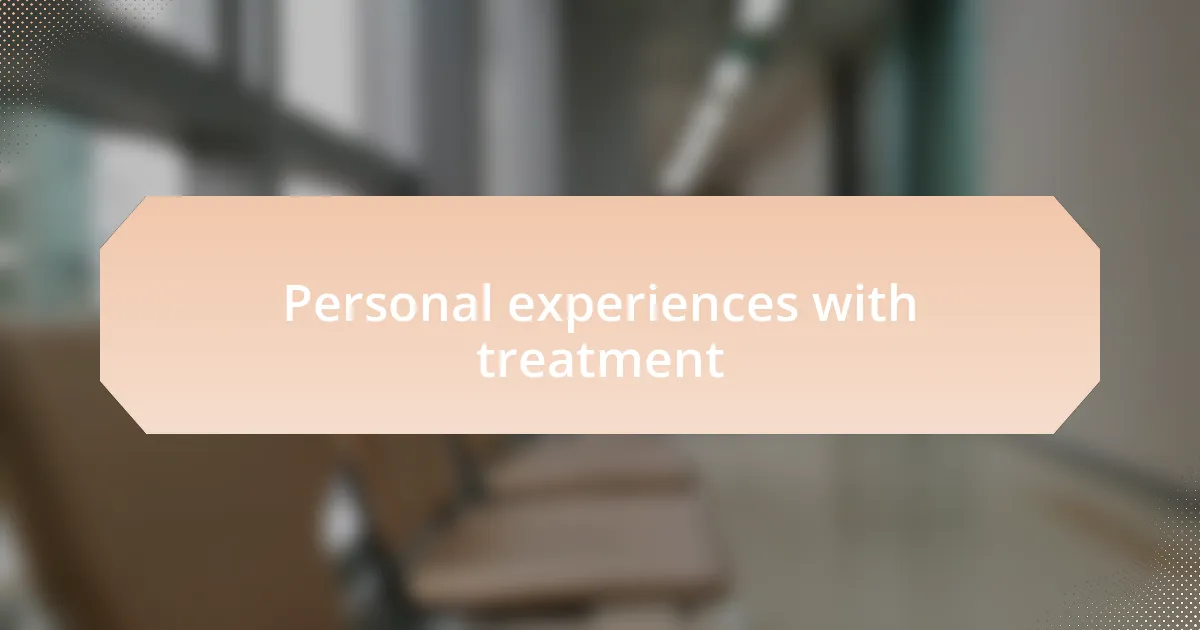
Personal experiences with treatment
Personal experiences with treatment can shape our understanding of both healthcare and human connection. I recall a particularly tough period during my own treatment journey. The uncertainty was overwhelming, but during one memorable session, the nurse took a moment to share her own story of resilience. It was a small gesture, yet it made me feel seen and understood. Have you ever had someone’s vulnerability illuminate your path in a difficult time?
Throughout my treatment, I discovered the power of routine. There were days when I felt like the weight of the world rested on my shoulders. On those days, my physical therapist greeted me with encouragement, turning my sessions into moments of empowerment. There’s something about regularly facing challenges alongside someone else that fosters a unique bond. Have you ever noticed how shared struggles can bring people closer together?
Reflection on my treatment experiences led me to appreciate the emotional rollercoaster it can be. One of the days that stands out was when I celebrated a small victory; I managed to walk a few more steps than the day before. It wasn’t just progress — it was a reminder that every small win counts. How often do we fail to recognize the significance of small milestones during our journeys? In the realm of treatment, those small victories can illuminate the path ahead, propelling us forward.
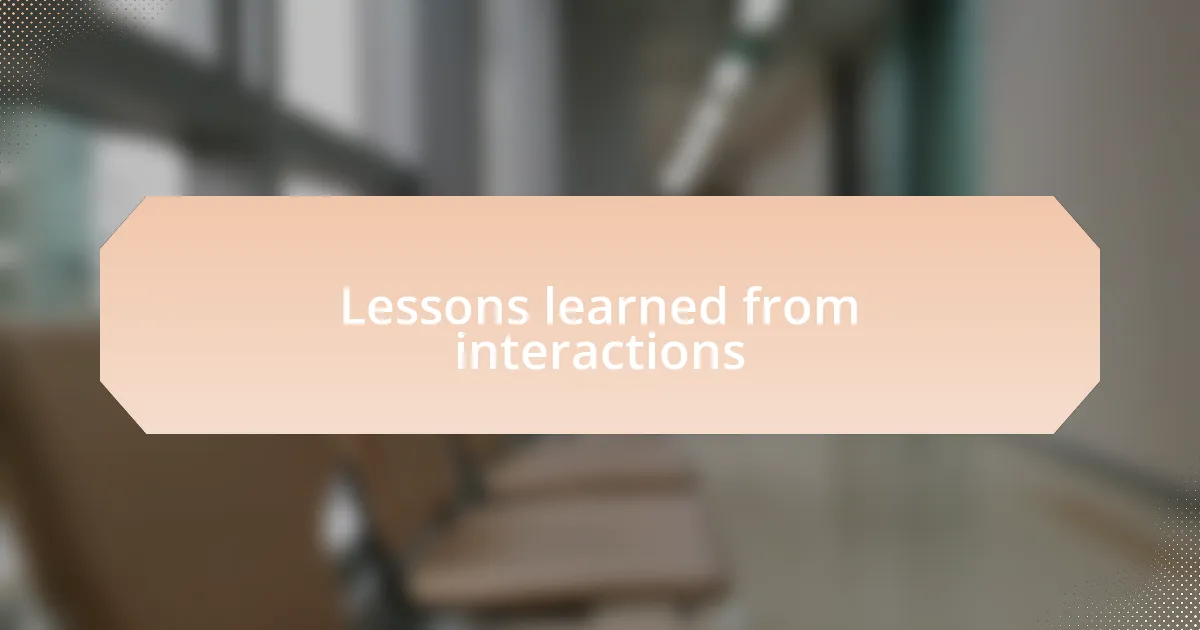
Lessons learned from interactions
During my treatment, every interaction was a lesson in empathy and connection. I remember sitting in the waiting room, overhearing a heartfelt conversation between two patients. Their shared laughter was a powerful reminder that we’re not alone in our battles. Have you ever noticed how the simple act of connecting with another person can lighten the burden of your struggles?
Another moment that struck me was during a group therapy session where we were encouraged to share our fears. One participant spoke about their anxiety regarding the future, and I found myself nodding along, feeling a sense of solidarity. It became clear that vulnerability could cultivate an atmosphere of trust, allowing us all to feel safe sharing our truths. Have you experienced the relief that comes from revealing your fears to someone who truly understands?
Interactions often highlighted the importance of listening. One day, I had a deep conversation with a volunteer who came to chat. Instead of offering advice, they simply listened, which was transformative for me. In that moment, I understood that sometimes the best gift we can give each other is our presence and undivided attention. Isn’t it fascinating how powerful a listening ear can be in someone’s healing journey?
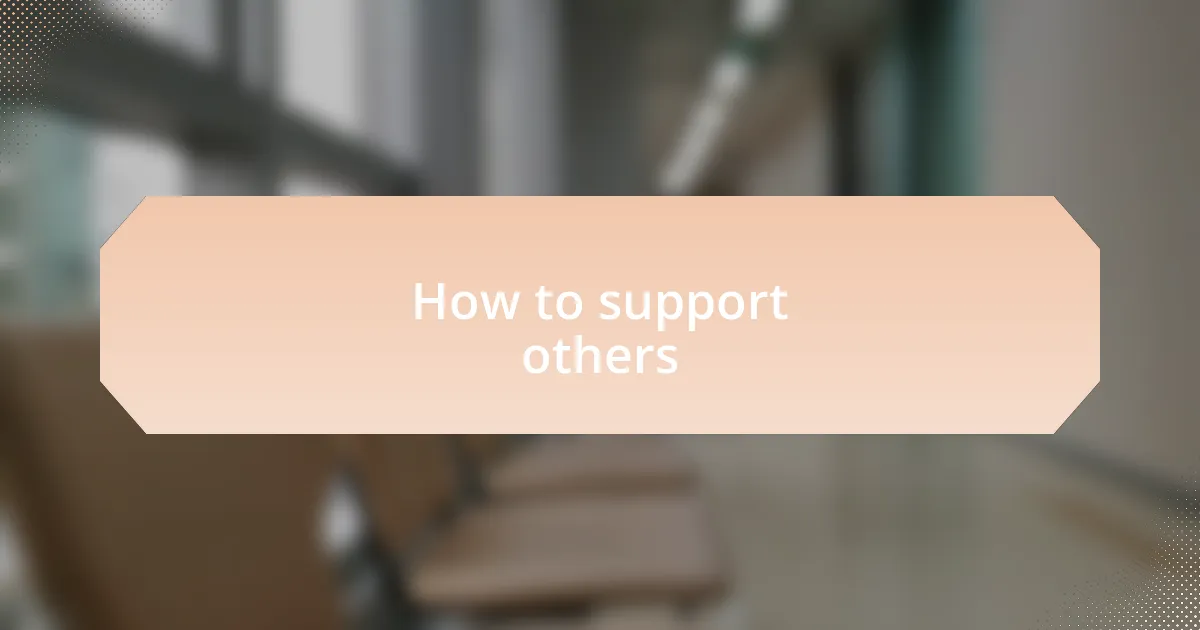
How to support others
Supporting others during challenging times can be as simple as offering your time and attention. I recall sitting with a friend who was grappling with her diagnosis. Instead of attempting to uplift her with words, I just sat quietly, allowing her to express her fears and anxieties. It was in those moments of silence that she felt truly heard. Have you ever realized that sometimes, just being present can make a world of difference?
Building a network of compassion is essential, and I learned this firsthand. While in treatment, I witnessed the profound effect of small gestures—like a handwritten note or a warm meal shared among fellow patients. One day, I received a thoughtful card from a former patient who had moved on to recovery. The message resonated deeply, reminding me that kindness and encouragement can spark hope in the most difficult times. Isn’t it uplifting to know that our words and actions have the power to inspire others?
Lastly, I’ve discovered that sharing our journeys can be incredibly supportive. One evening, I joined a discussion group where stories flowed freely. Each narrative, including mine, was a reminder that trauma doesn’t define us; it’s how we rise and support each other that truly matters. Have you experienced that communal strength in vulnerability? It became clear to me that our willingness to share can empower those around us to embrace their own paths to healing.
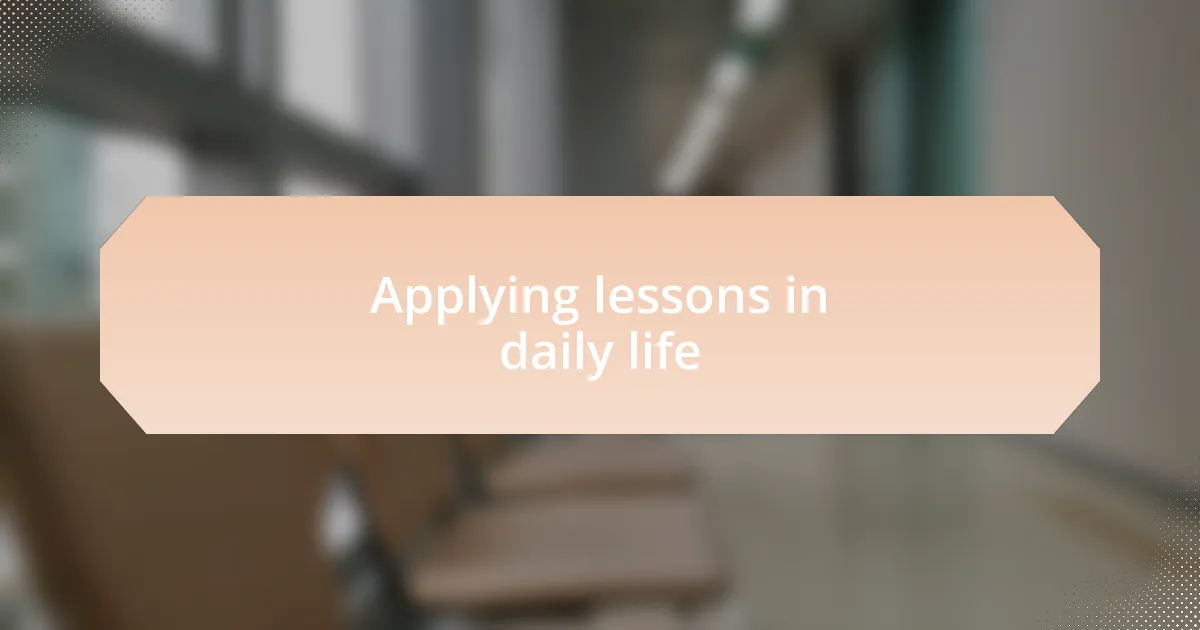
Applying lessons in daily life
Applying lessons in daily life often comes down to how we interact and connect with those around us. I remember a day during my recovery when I met someone who was just starting their journey. I decided to share my experience with them, not to overshadow their struggle but to offer a point of light. I could see their eyes brighten as I spoke, and in that moment, I realized that my story held the power to inspire hope—have you ever realized how sharing your journey can create a ripple effect of encouragement?
I’ve also found that practicing gratitude can transform daily interactions. One morning, I made it a point to compliment a stranger who was struggling with their own issues that day. The smile that crossed their face was a beautiful reminder of our shared humanity. It got me thinking—when was the last time you acknowledged someone else’s effort? Simple acts of kindness can create unexpected bonds and uplift the spirit of both the giver and the receiver.
Moreover, embracing vulnerability in my daily life has been eye-opening. I now make it a habit to express my feelings more openly, whether it’s sharing my fears or joys with friends. In a recent conversation, I opened up about a lingering worry, and to my surprise, my friend shared a similar struggle. This mutual sharing not only deepened our connection but also highlighted that we often carry similar burdens. How liberating it is to know that vulnerability is not a weakness, but a bridge to stronger relationships!